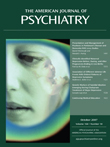Mortality Risk in Patients With Dementia Treated With Antipsychotics Versus Other Psychiatric Medications
Abstract
Objective: Mortality rates in the year following new antipsychotic medication starts for neuropsychiatric symptoms of dementia were compared with rates after starts of other psychiatric medications. Method: The retrospective, cohort study used national data from the Department of Veterans Affairs (fiscal years 2001–2005) on patients older than 65 years who began outpatient treatment with psychiatric medication following a dementia diagnosis (N=10,615). Twelve-month mortality rates were compared in patients taking antipsychotics and those taking other psychiatric medications. The authors controlled for confounding by using multivariate models and propensity-scoring methods. Secondary analyses included a no-medication group and examination of mortality causes. Results: All groups taking antipsychotics had significantly higher mortality rates (22.6%–29.1%) than patients taking nonantipsychotic medications (14.6%). Adjusted mortality risks for atypicals and for combined atypical and conventional antipsychotics were similar to those for conventional antipsychotics. The mortality risk was significantly lower for nonantipsychotic medications than conventional antipsychotics. Except for anticonvulsants, the adjusted risks for all individual classes of nonantipsychotics were significantly lower than the risk for antipsychotics. Mortality risks did not change over 12 months. The proportions of patients taking antipsychotics who died from cerebrovascular, cardiovascular, or infectious causes were not higher than rates for those taking nonantipsychotic psychiatric medications. Conclusions: Antipsychotic medications taken by patients with dementia were associated with higher mortality rates than were most other medications used for neuropsychiatric symptoms. The association between mortality and antipsychotics is not well understood and may be due to a direct medication effect or the pathophysiology underlying neuropsychiatric symptoms that prompt antipsychotic use.



